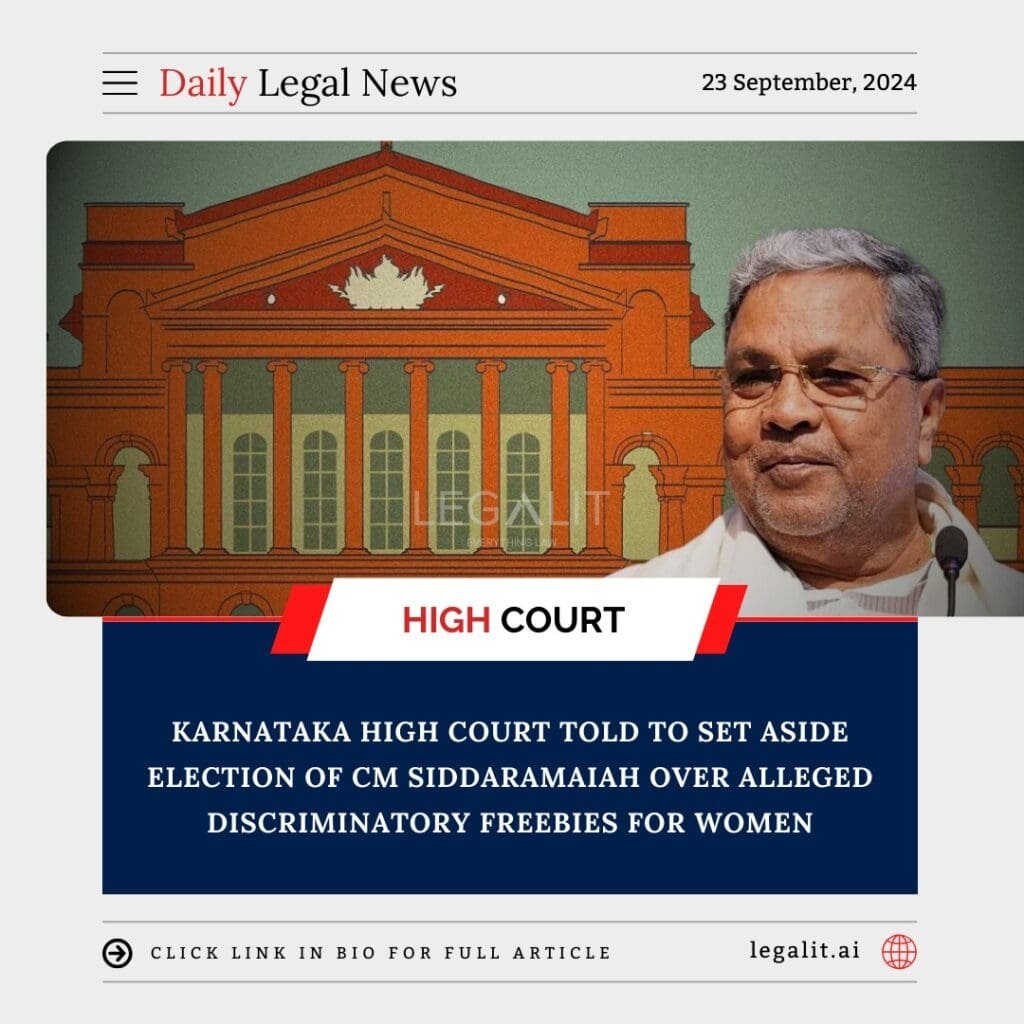
In a noteworthy legal challenge, the Karnataka High Court has been urged to nullify the election of Chief Minister Siddaramaiah, with the petitioner alleging that the freebie schemes rolled out for women voters were discriminatory against men. The argument hinges on the claim that offering exclusive benefits to women during election campaigns violates the principle of equality under the Constitution and undermines the fairness of the electoral process.
Key Allegations
The petition argues that CM Siddaramaiah’s election should be invalidated on the grounds that his party’s promises of free schemes targeted exclusively at women amounted to discrimination based on gender. These schemes, according to the petitioner, provided undue advantage to women voters, effectively ignoring the needs and rights of male voters, thereby violating the fundamental Right to Equality (Article 14) under the Constitution of India.
Freebie Schemes in Question
The Congress Party, under CM Siddaramaiah, campaigned with a focus on several welfare measures targeted at women. These included:
- Shakti Scheme: Free bus rides for women across the state.
- Gruha Lakshmi Scheme: Financial aid of ₹2,000 per month for women heads of families.
- Gruha Jyothi Scheme: Free electricity up to a certain limit for households, with women being a primary target for the benefit.
The petitioner claims that these schemes, while appealing to a large section of women voters, disregarded the interests of male voters, creating an imbalance that skewed the election in favor of the ruling party.
Legal Arguments Presented
- Discrimination Based on Gender: The petitioner argues that offering gender-specific benefits violates the Right to Equality, as the schemes were targeted exclusively at women. This, they claim, contravenes the principle of gender neutrality in public welfare and discriminates against men, who were not beneficiaries of similar government schemes.
- Violation of Free and Fair Elections: The petition further contends that the use of state resources to promise benefits to a specific section of voters distorts the democratic process. It alleges that these promises constituted a violation of free and fair elections, as they incentivized a particular voting demographic at the cost of others.
- Electoral Irregularities: By linking the schemes to election outcomes, the petition suggests that these promises may have had a direct influence on the election results, tipping the scales in favor of CM Siddaramaiah’s party and raising questions about the fairness of the electoral process.
Defense of the Freebie Schemes
On the other side, supporters of CM Siddaramaiah’s policies argue that welfare measures targeting specific groups, such as women, are essential for promoting inclusivity and addressing historical inequalities. In defense of these schemes, they assert:
- Welfare for Marginalized Groups: Advocates of the schemes highlight that many women, especially from economically weaker sections, face systemic barriers and discrimination. Therefore, providing targeted welfare is not discriminatory but necessary to uplift marginalized sections of society.
- No Constitutional Violation: The defense claims that the schemes do not violate Article 14 of the Constitution because they are aimed at ensuring social welfare and reducing inequality, which is a valid basis for classification under the law.
Implications of the Case
- Judicial Review of Freebie Politics: The outcome of this case could have broader implications for electoral promises made by political parties. A ruling against the election could set a precedent for curbing the practice of offering gender-specific or class-specific freebies during campaigns.
- Debate on Gender Equality in Welfare: The case brings into focus the ongoing debate about the balance between gender-specific welfare policies and the need for equal treatment of all citizens. It raises questions about whether welfare schemes aimed at a particular gender can be considered discriminatory or whether they are justified as part of social equity efforts.
- Impact on Future Elections: If the court rules that gender-specific freebies are unconstitutional or violate electoral fairness, it could prompt significant changes in how political parties design their campaign strategies, especially in relation to offering benefits to specific voter demographics.
Conclusion
The Karnataka High Court is now faced with a significant legal and constitutional question regarding the validity of gender-targeted welfare schemes and their impact on electoral fairness. The case against CM Siddaramaiah’s election, based on the allegation that freebies for women discriminated against men, will test the limits of equality and fairness in election promises. As the court deliberates on the case, its decision could have far-reaching consequences for how political parties in India approach welfare policies in future elections.